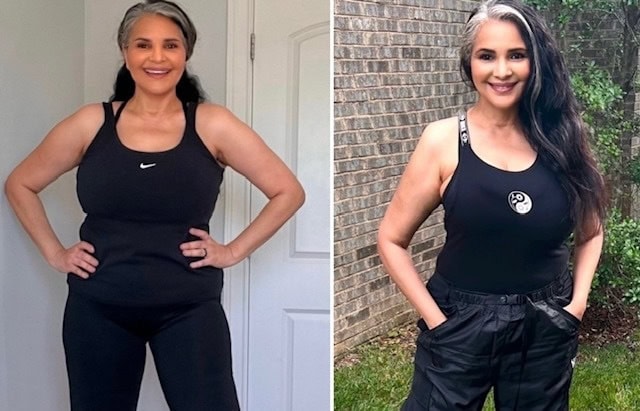What you’ll learn:
- Hormonal changes during perimenopause can lead to increased fat storage, particularly around the midsection.
- A slowing metabolism makes it easier to gain weight and harder to lose it as you age.
- Balanced nutrition, staying active, and mindful eating can help manage perimenopause weight gain.
Experiencing unexpected weight changes or noticing more belly fat as you approach menopause? Many people see body shifts during perimenopause, the transitional phase that often starts in the 40s and can last for several years. On average, weight gain during perimenopause is around five pounds, although it can be more for some.
This stage brings hormonal fluctuations that impact metabolism and fat storage, but aging and lifestyle changes also play a role. Other symptoms can range from mood swings and hot flashes to sleep disturbances and higher stress levels, which can all affect weight and wellness.
Understanding what’s happening with your body is a key first step. With the right tools and support, you can navigate perimenopause and maintain a healthy weight. Noom’s personalized approach helps you manage these changes and build strategies to support your health through this transition and beyond.
What is perimenopause?
Menopause is broken up into three phases. Perimenopause is the period of hormonal change before menopause as the ovaries release fewer eggs. Menopause is the day when you haven’t had a period for a year. Everything after that is postmenopause.
During perimenopause, your hormones—mainly estrogen and progesterone—begin to fluctuate. These shifts can lead to irregular periods, hot flashes, mood swings, and weight gain, particularly around your midsection. For some, these symptoms come and go quickly, while others may experience them for several years before officially reaching menopause.
How do you know you’re in perimenopause? That’s tricky! For people over 45, perimenopause is typically identified by common signs like irregular periods and hot flashes. For those using hormonal birth control, diagnosis can be more challenging since these treatments may affect menstrual patterns. Consult with your doctor to get a better idea of where you are in the menopause journey.
The key is to understand what’s happening in your body. Then, you can take steps to stay in control and feel your best as you navigate through it.
What causes weight gain during perimenopause?
Weight gain is common during perimenopause due to hormonal fluctuations and a slowing metabolism. Your body also changes how it stores fat and regulates hunger, making it harder to maintain your weight. But hormones aren’t controlling everything; other factors like exercise frequency, quality of sleep, and stress levels can also impact your likelihood of gaining weight. Let’s take a look at what is happening.
How hormonal fluctuations can cause weight gain
Perimenopause brings hormonal changes that can affect your body shape and size. Here’s a look at what they do to your body:
- Decreasing estrogen can increase belly fat: Lower estrogen levels shift fat storage toward the abdomen, which can increase health risks. You could see an increase in belly fat without gaining weight or changing your habits.
- You could lose muscle mass: Aging often comes with muscle loss, partly due to declining estrogen levels, which slows metabolism and makes weight management more challenging.
- Hormonal changes increase cortisol (the stress hormone): Perimenopausal hormonal changes can raise cortisol levels, leading to more fat stored around your belly. Studies suggest that these changes are driven mainly by hormones rather than stress alone.
- Insulin resistance can increase: Reduced insulin sensitivity can make it harder to maintain your usual weight, raising the risk of type 2 diabetes.
- Sleep could be disrupted: Lower estrogen levels during perimenopause can disrupt sleep, leaving you more fatigued. Poor sleep can cause your body to produce more cortisol, which further enhances fat storage and complicates weight loss.
Rx weight loss, the right way, with Noom
Get access to prescription weight loss medication with Noom.How to manage perimenopause weight gain
Perimenopause can throw your body out of balance, but how you eat, move, sleep, and deal with stress can help you regain control. Maintaining a balanced diet filled with lean proteins, fruits, vegetables, whole grains, and healthy fats can help you keep your weight in check.
What to eat during perimenopause
- Increase protein for muscle maintenance: During perimenopause, prioritizing protein intake can help offset natural muscle loss and support metabolism. Incorporating protein at every meal, especially at breakfast, helps maintain muscle mass, which is crucial for healthy aging. Ideal sources include lean meats like chicken and fish, low-fat dairy, and plant-based options like tofu, legumes, and quinoa—all of which also promote satiety, aiding in weight management.
- Eat more fruits and vegetables: A diet rich in fruits and vegetables can reduce visceral fat. A large study of people between 45 and 65 found that those who ate more fruits and vegetables and fewer sweet snacks and desserts had less visceral fat. Choosing nutrient-dense foods can help manage menopause-related fat gain while supporting long-term health.
- Add fiber for digestion and blood sugar balance: Fiber helps manage appetite, maintain stable blood sugar levels, and support digestive health. High-fiber foods like oatmeal, whole grains, and legumes slow digestion and provide lasting fullness, which aids in weight management. Aim for 25–30 grams of fiber daily to promote steady energy levels and overall wellness.
- Prioritize calcium for bone health: As estrogen declines, bone density can decrease, making calcium intake crucial to protect against osteoporosis. Include low-fat dairy and high-calcium foods like leafy greens (kale, collard greens), almonds, tofu, sardines, chia seeds, and fortified plant-based milk.
- Vitamin D for enhanced calcium absorption: Vitamin D is essential for calcium absorption, which is crucial for bone and muscle health in menopause. This vitamin also supports heart health, which is particularly beneficial during this stage. Getting sunlight and including foods like fatty fish, egg yolks, and fortified foods can help maintain adequate vitamin D levels. Supplements may be necessary depending on diet and sun exposure.
Remember, even small changes can lead to significant improvements in how you feel. By focusing on nutrient-dense foods most of the time, you’re giving your body what it needs to manage hormone shifts. Noom’s personalized approach can help you find the right balance of these nutrients for your unique needs.
How to incorporate cardio and strength training
Adding both cardio and strength training to your week can be especially helpful during perimenopause. Cardio activities like brisk walking, cycling, or swimming support heart health, lift your mood and help keep your metabolism active. Regular cardio also helps reduce visceral fat. Aim for 150–300 minutes of moderate cardio each week, but feel free to break it into small, manageable sessions to keep it doable. And don’t forget to pick something you enjoy so you’ll feel motivated to get moving!
Strength training is key during perimenopause. It helps maintain muscle and bone strength, which can be impacted by lower estrogen levels. Exercises like light weightlifting, bodyweight moves, or resistance band workouts help keep your metabolism active and improve your strength for everyday tasks. Plus, research suggests that strength training can ease common symptoms like mood swings, fatigue, and sleep troubles during this stage.
New to strength training? For a simple, no-equipment beginner strength routine, try this workout three times a week after a walk or bike ride:
- Wall or countertop push-ups: 3 sets of 10
- Bodyweight squats: 3 sets of 10
- Lunges: 3 sets of 10
Noom’s Success Kit also has a variety of on-demand exercises for people of all fitness levels to build and maintain muscle mass.
Tips for managing stress
Exercise is a fantastic stress-buster, but adding a few more strategies can help keep stress levels in check. Chronic stress can increase your cortisol levels, which can promote fat storage in the abdominal area, increase cravings, and even lead to insulin resistance. Try these strategies to reduce it:
- Incorporate relaxation techniques: Meditation, deep breathing, and yoga all help lower cortisol and support emotional balance. Just 10–15 minutes a day can make a difference, calming stress and improving sleep. Gentle, restorative yoga poses can also be great for unwinding and managing anxiety.
- A nutrient-rich diet with magnesium and omega-3s: A balanced diet with foods like nuts, leafy greens, salmon, and ground flaxseed can help regulate cortisol. Magnesium may improve sleep and reduce anxiety, while omega-3s can help stabilize mood and ease stress.
- Time management and boundaries for self-care: To avoid burnout, set boundaries and balance work, family, and personal time. Dedicate time for relaxation, set realistic goals, and say “no” when needed to create room for self-care.
- Practice mindfulness for stress and eating habits: Mindfulness practices like deep breathing and mindful eating help keep stress in check and promote healthier choices. Staying present can build resilience, improve focus, and encourage better dietary habits.
Tips for getting better sleep
As you enter perimenopause, hormonal changes can make sleep more challenging, often bringing night sweats and other disruptions. Add in increased stress, and you might experience restless nights that lead to fatigue—and even impact weight management. Here are some strategies to help promote better sleep during perimenopause and beyond:
- Limit eating and drinking in the evening: Try to finish eating at least three hours before bed and stop drinking fluids two hours prior. This can reduce nighttime wake-ups due to digestion or bathroom trips.
- Stick to a consistent sleep schedule: Going to bed and waking up at the same time daily, even on weekends, can help regulate your body’s natural sleep cycle.
- Create a comfortable, cool bedroom environment: Hot flashes and night sweats can disturb sleep, so keep the room cool, use breathable bedding, and wear moisture-wicking sleepwear.
- Incorporate relaxation techniques: Try meditation, deep breathing, reading, or a warm bath before bed to reduce stress and ease into sleep. Managing stress at night can support deeper, more restful sleep.
- Cut out screen time before bed: Avoid looking at your phone, tablet, or computer at least an hour before bed to reduce blue light exposure, which can interfere with melatonin production and make it harder to fall asleep.
Better sleep can aid in hormonal balance, curb cravings, and boost metabolism, all of which may assist with weight management as you navigate perimenopause and beyond.
How to lose weight during perimenopause
The fundamentals of weight loss remain the same during perimenopause: you need to consume fewer calories than your body expends. Hormonal shifts affecting metabolism, sleep, and hunger can make maintaining a calorie deficit challenging. Here’s what to focus on if weight loss is your goal and how Noom can support you:
- Prioritize protein, portion control, and hydration: Protein supports muscle and helps you feel full, which can manage appetite and metabolism. Track your portions and stay hydrated to prevent unnecessary snacking—Noom’s food and water trackers can help.
- Get active with cardio and strength training: Cardio supports calorie burn, and strength training preserves muscle for a stable metabolism. Noom Move offers 1,000+ workouts for every fitness level to help keep you moving.
- Manage stress and sleep: Chronic stress and poor sleep can increase cortisol, which may lead to weight gain around the abdomen. Noom’s Success kit includes resources for yoga, meditation, and emotional wellness to support relaxation and quality sleep.
By focusing on these habits and using Noom’s tools, you can make healthy changes that align with your weight loss goals.
Can medication help me lose weight during perimenopause?
For those concerned about weight gain, GLP-1 medications, like Ozempic®, Wegovy®, or Zepbound®, might help. GLP-1 medications work by reducing appetite, slowing down digestion, and making you feel full longer, potentially leading to weight loss.
GLP-1 medications can be prescribed for people with a BMI of 30 and above or 27 and above with at least one weight-related medical condition (like high blood pressure or cholesterol).
To find out if a GLP-1 could be right for you, see if you qualify for Noom Med. Our clinicians can help identify and prescribe the right medication, if applicable, while providing guidance and support throughout your treatment.
Will hormone replacement therapy during perimenopause help me lose weight?
If you’re going through perimenopause, you might be thinking about how hormone replacement therapy (HRT) can help. It is primarily used to manage symptoms like hot flashes, mood swings, and vaginal dryness and won’t directly help you lose weight without a lower-calorie diet and lifestyle changes. It can help with the redistribution of weight around the midsection, as well as help to address symptoms that can indirectly lead to weight gain, like poor sleep quality and metabolism changes.
The best time to start HRT is usually in perimenopause or right after menopause. It helps balance your hormones when they’re starting to fluctuate. Talk to your doctor about how you’re feeling; they can guide you through the best timing and whether it’s the right choice.
How Noom can help you through perimenopause
Perimenopause brings changes, but it doesn’t have to derail your health goals. Hormonal shifts and a slowing metabolism can impact your weight, but with the right support, you can stay in control and feel your best. Noom’s personalized program is designed to help you navigate these changes confidently.
Here’s how Noom can support you:
- Personalized plans that fit your needs: Hormonal changes affect appetite, energy, and how your body stores fat. Noom creates a tailored strategy based on your goals, helping you build habits that work with your body’s changes, not against them.
- Understanding your eating habits: It’s not just what you eat—it’s why. Noom’s psychology-based approach helps you identify triggers and break the cycle of stress eating. Our color-coded food system also makes healthy choices simple and satisfying.
- Coaching and community support: You don’t have to go through this alone. Our trained coaches offer guidance, while our community connects you with others on a similar journey for encouragement and shared tips.
- Strategies for lasting change: From meal planning to stress management, Noom provides practical tools that evolve with your needs. This flexible approach keeps you on track and motivated, no matter what changes life brings.
- Beyond weight management: It’s about thriving, not just losing weight. Noom helps you boost energy, sleep better, and feel more confident during this transition.
If you want even more support, Noom’s Healthy Aging and Metabolism Course dives into the science behind age-related weight changes and provides strategies tailored to your stage of life. It can be added to any Noom program.
Learn how Noom can help you feel your best through perimenopause and beyond. Fill out our questionnaire today to see how much you can lose!
Note: Ozempic® is not FDA-approved to treat obesity or for weight loss.
Why you can trust us
At Noom, we’re committed to providing health information that’s grounded in reliable science and expert review. Our content is created with the support of qualified professionals and based on well-established research from trusted medical and scientific organizations. Learn more about the experts behind our content on our Health Expert Team page.



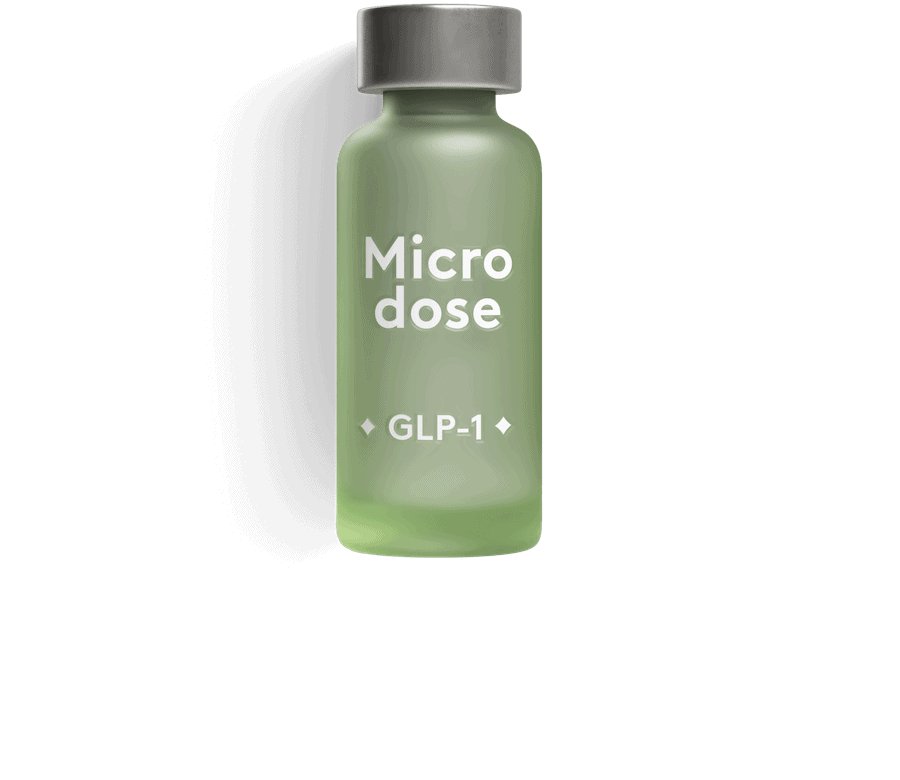
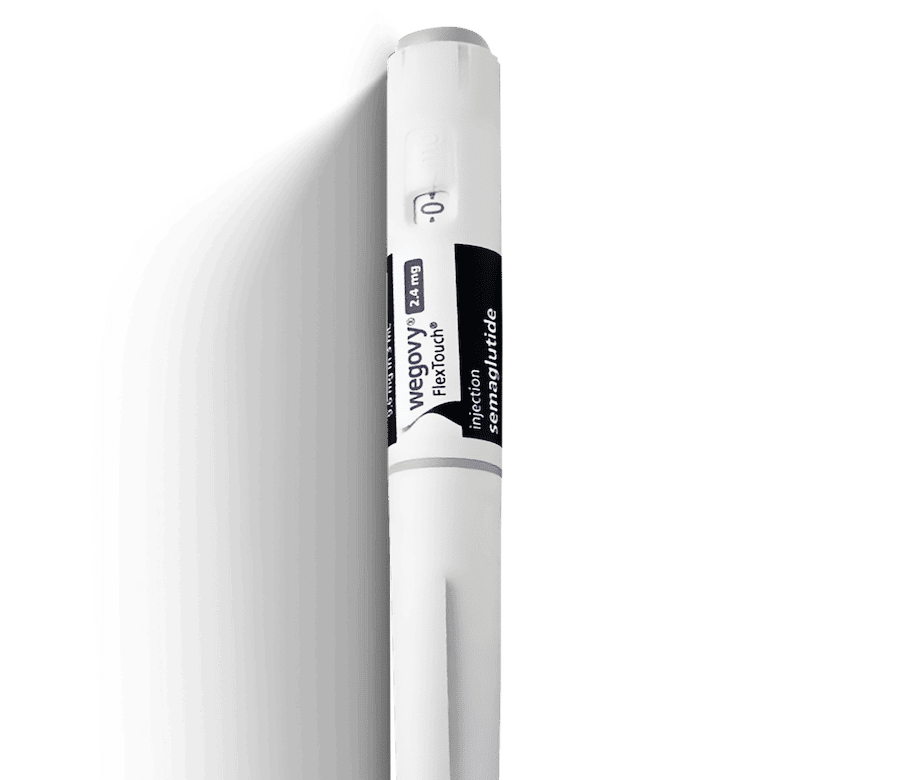

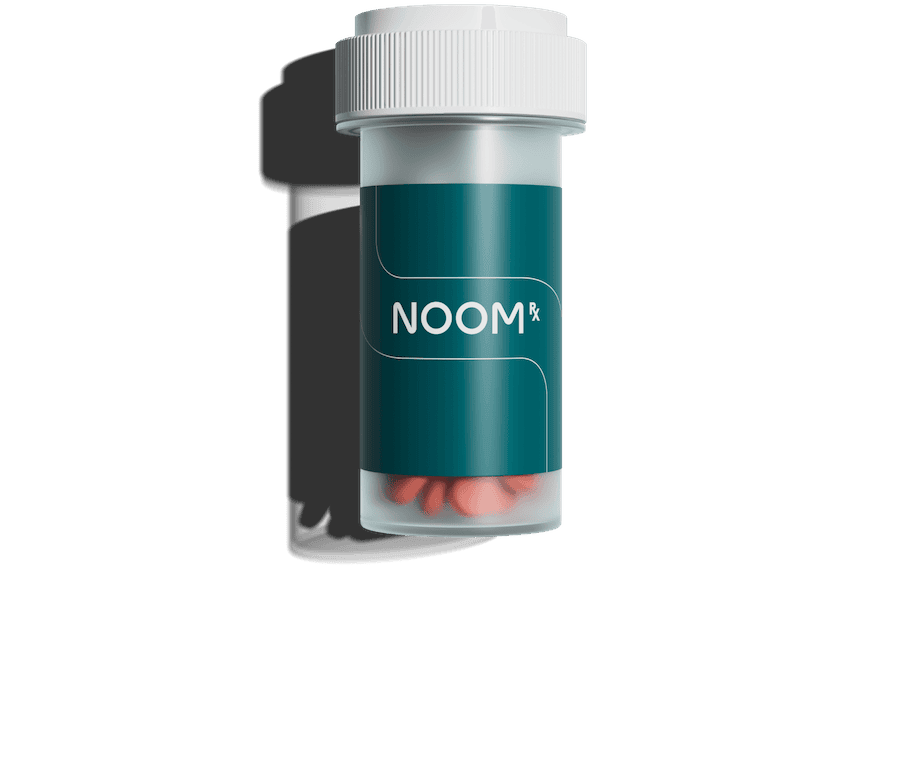

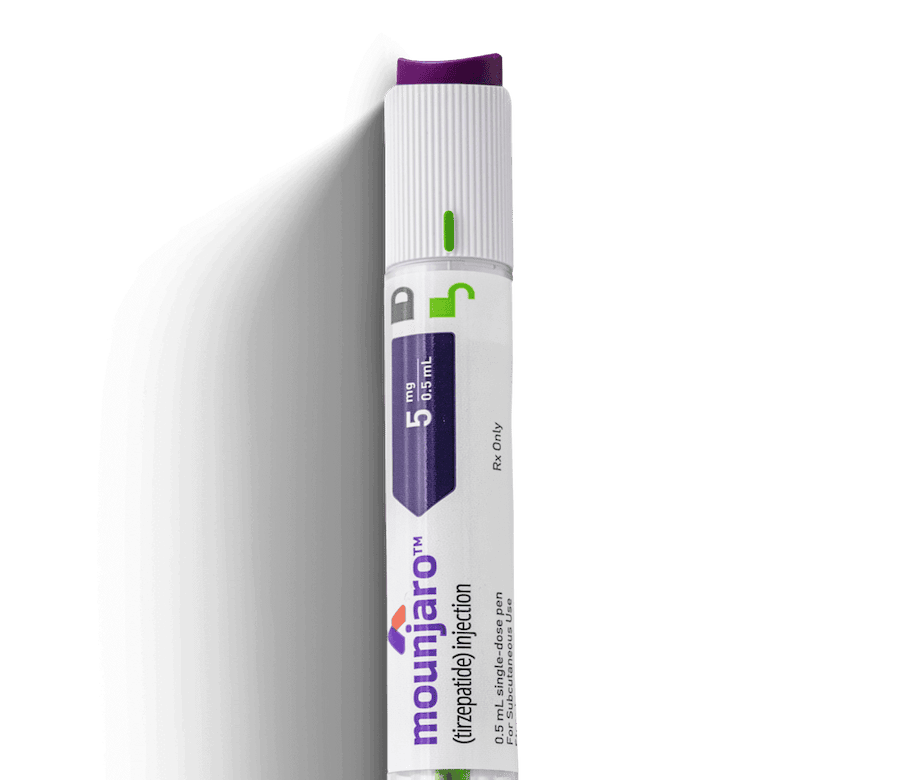
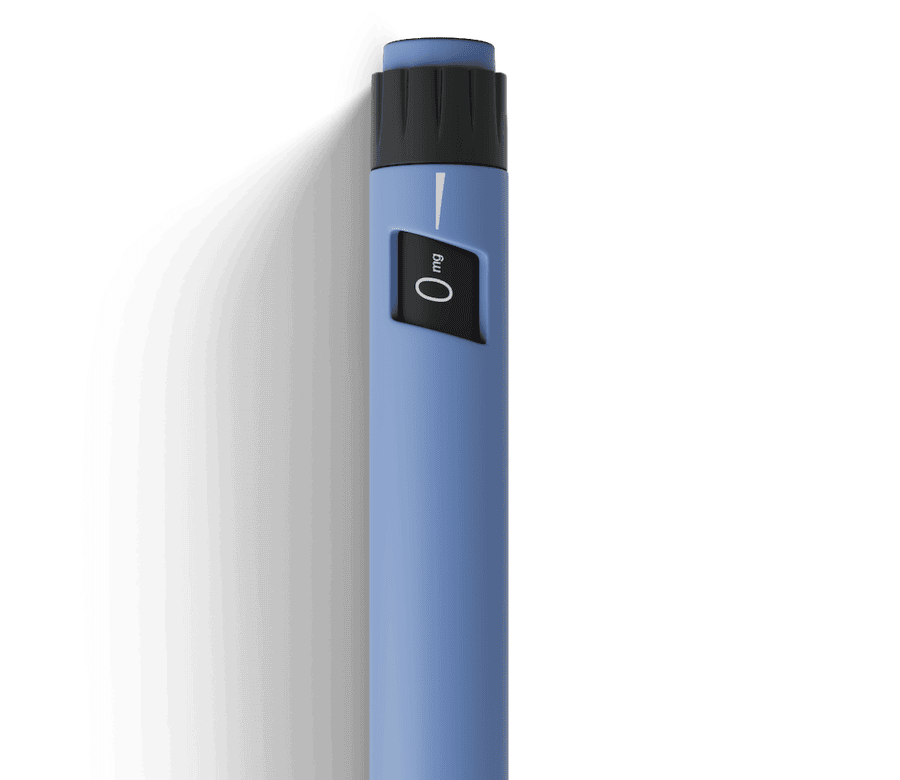


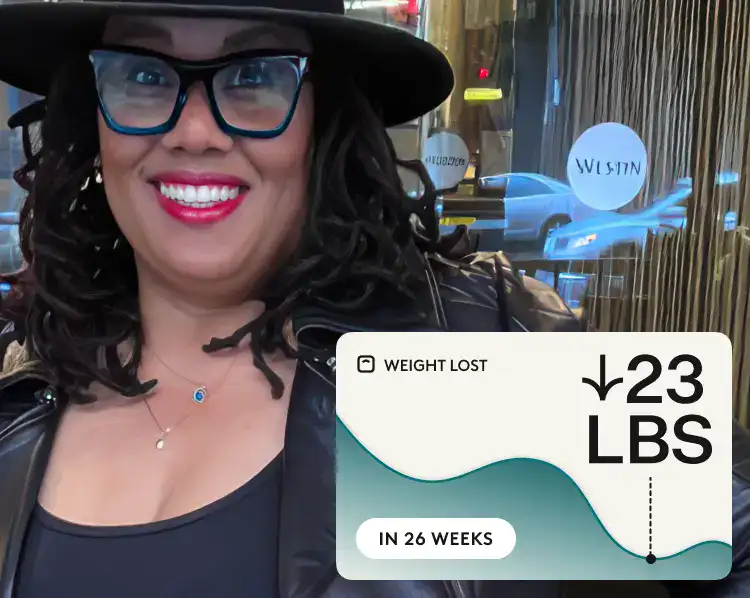
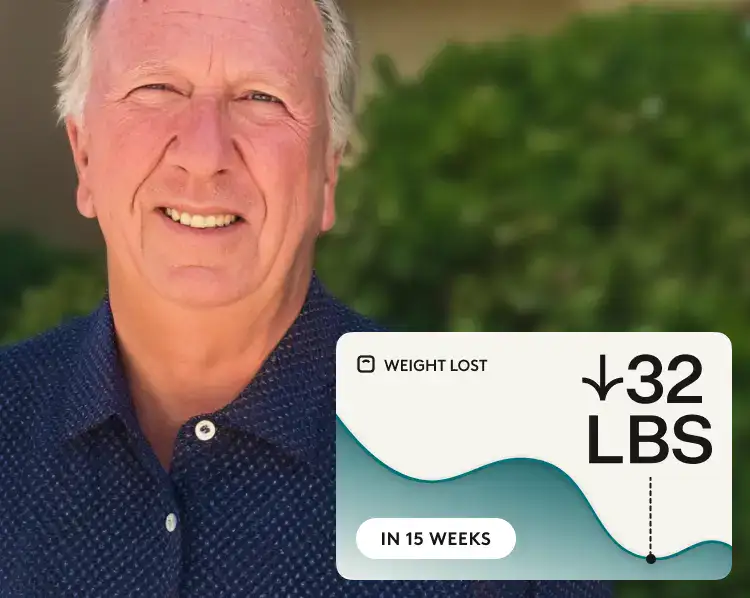
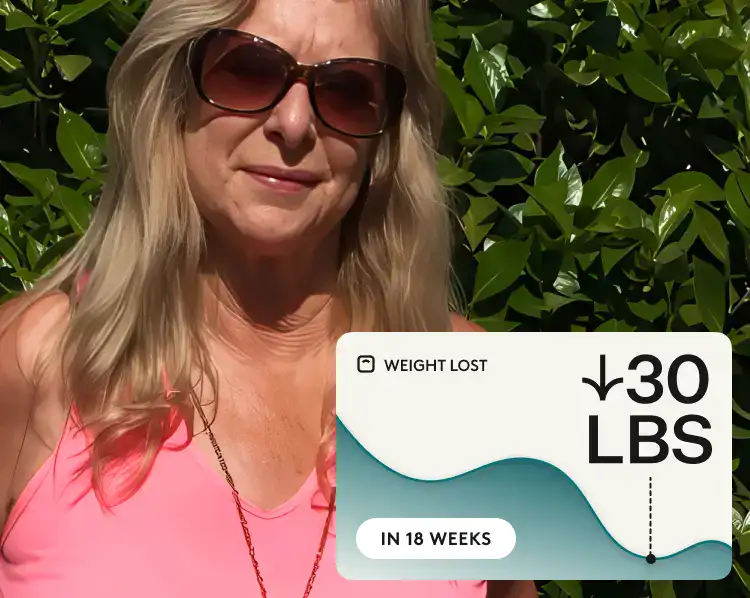
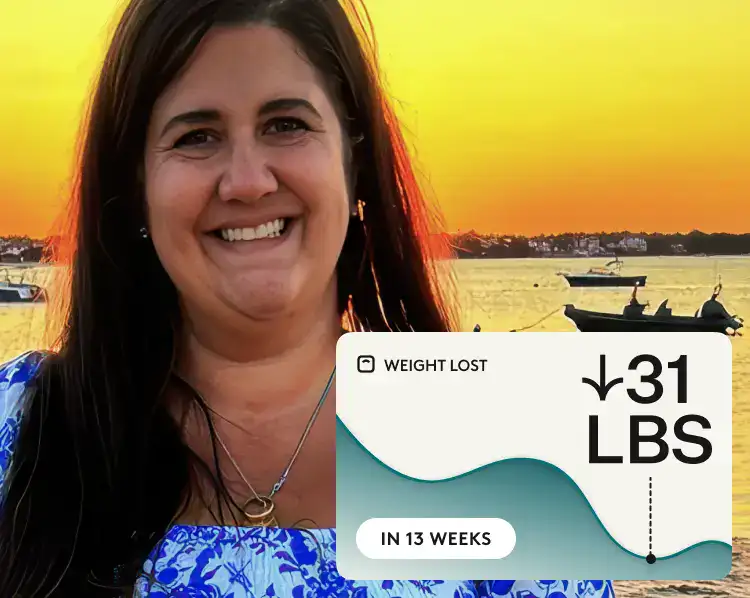

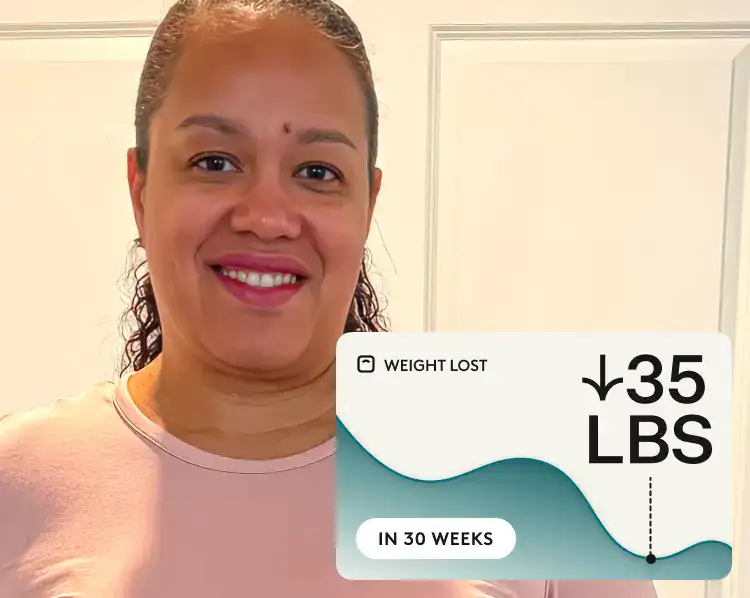


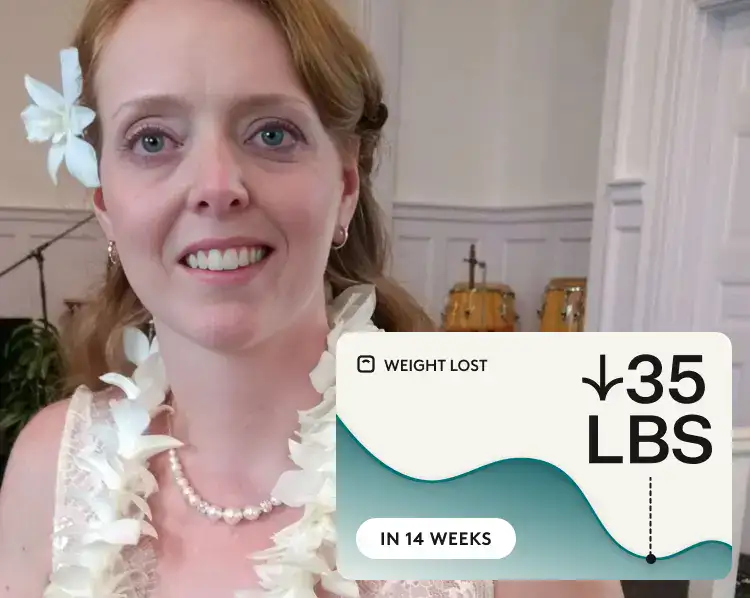

 Noom Team
Noom Team
 Meaghan Cameron
Meaghan Cameron


 Shoshana Fishbein
Shoshana Fishbein